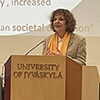The MRER Project is expanding with the launch of another initiative - The MRER Seminar Series. The MRER Project is coordinated by Prof. Carmel Borg, Department of Arts, Open Communities and Adult Education, and fully supported by the Faculty of Education at the University of Malta.
Date: Thursday 14 April
AprilTime: 17:00 – 19:00hrs
Venue: ITS (Institute for Tourism Studies)
Assembly Hall
Trejqet il-Bajja, St. Julians.
(Ample parking and coffee/tea available)
FOREIGN LANGUAGES – THEIR NEED IN MALTA TODAY
Panel
Dr Mario Pace – Faculty of Education, University of Malta – Chair
Dr Nadia Maria Vassallo - Director of Curriculum, Learning Support Unit - MCAST
Ms Rachel Tabone Hall, HR Manager, LeoVegas
Dr Phyllisienne Vassallo Gauci – Foreign Language Teaching & Learning Expert
Ms Angela Attard Fenech - Director - Tumas Group & member of Institute for Tourism Studies (ITS) Board of Governors.
Abstract
The European Parliament considers languages not just as an important priority for the EU but also as an integral part of its identity and the most direct expression of culture. In Europe, the ability to communicate in several languages has become a must for individuals, organisations and companies alike.
The EU language policy regards foreign language competence as one of the basic skills that all EU citizens need to acquire in order to improve their educational and employment opportunities within the European learning society. This explains why the European Commission fosters multilingualism and language learning and, in fact, its set goal is to have a Europe where everyone is taught at least two languages in addition to their own mother tongue from a very early age. Furthermore, the ‘Education and Training 2020’ strategic framework identifies language learning as a priority and considers communication in foreign languages as one of eight key competences needed to improve the quality and efficiency of education and training.
It is a known fact that countries in the world have, over the past two decades, become more and more interdependent, and new technologies have blurred many existing borders. This has led to a situation where foreign language instruction has become more necessary than ever for linking with the rest of the world and for producing an enlightened citizenship able to function in today’s ever-shrinking world. Pace (2015: 99) argues that “in today‘s world there is an ever-increasing need for good communication skills in foreign languages. Parents around the five continents strive to ensure that their children achieve a good command in a number of foreign languages” and that consequently, a large number of opportunities to learn languages have been provided in many different ways such as through formal instruction, travel, study abroad, as well as through the media and the internet. This, has brought in turn, according to Vandergrift and Goh (2012) new challenges that learners have to face in the classroom and beyond, especially as they try to improve their ability in specific language skills.
Multilingualism is today considered to be one of the key elements of a modern Europe, given that learning foreign languages permits citizens to enrich their lives, to gain familiarity with new concepts and to benefit from cultural diversity. In today’s European society, multilingualism and interculturalism play a fundamental role in order to communicate effectively, to extend one’s circles beyond the local dimension, to develop an open disposition towards diversity and change and, therefore, also to enhance professional and economic development. As the European Commission declared in one of its documents on multilingualism, entitled, ‘Languages mean Business’, one of the main reasons why thousands of European companies lose out on concluding deals and contracts is their lack of linguistic and intercultural competencies.
Multilingualism in Malta is a major asset, especially when one considers the efforts and investment currently being made in Europe to enhance language competences in European schools. Historically Malta’s fortunes largely derived from the fact that its people were able to communicate with foreigners in their own language/s and that they were capable of using English whenever a specific communicative situation required this, while also retaining the capability to switch to other foreign languages if this was necessary, as in showing hospitability and openness to the other. The Maltese felt proud of their multilingualism. However, one must question if this is still the case, especially among the younger generations. Unfortunately, the number of school-leavers who have no accredited certification in foreign language skills is on the increase. This, notwithstanding the fact that they would have studied these languages for a number of years both at Primary as well as at Secondary level. This is very sad, even more so, in view of the fact that Malta’s economy is dependent on human resources and foreign trade, driven by financial services, iGaming and tourism.



